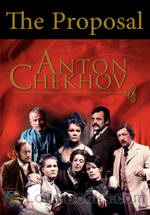|
Books Should Be Free Loyal Books Free Public Domain Audiobooks & eBook Downloads |
|
|
Books Should Be Free Loyal Books Free Public Domain Audiobooks & eBook Downloads |
|
Author Collection |
|---|
By: Anton Chekhov (1860-1904) | |
|---|---|
 The Proposal
The Proposal
The Proposal is a one act comic farce by Anton Chekhov. In Chekhov’s Russia, marriage was a means of economic stability for most people. They married to gain wealth and possessions. In this play, the concept of marriage is being satirized to show the real purpose of marriage – materialistic gain rather than true love. | |
 (Russian) Предложение (Predlozhenie)
(Russian) Предложение (Predlozhenie)
«Предложение» — шутка в одном действии известного русского писателя Антона Павловича Чехова. Завершена данная пьеса была в ноябре 1888 года. Действие происходит в усадьбе Чубукова. Иван Васильевич Ломов приезжает к своему соседу, Степану Степановичу Чубукову, чтобы просить руки его дочери. Казалось бы, что может случиться? | |